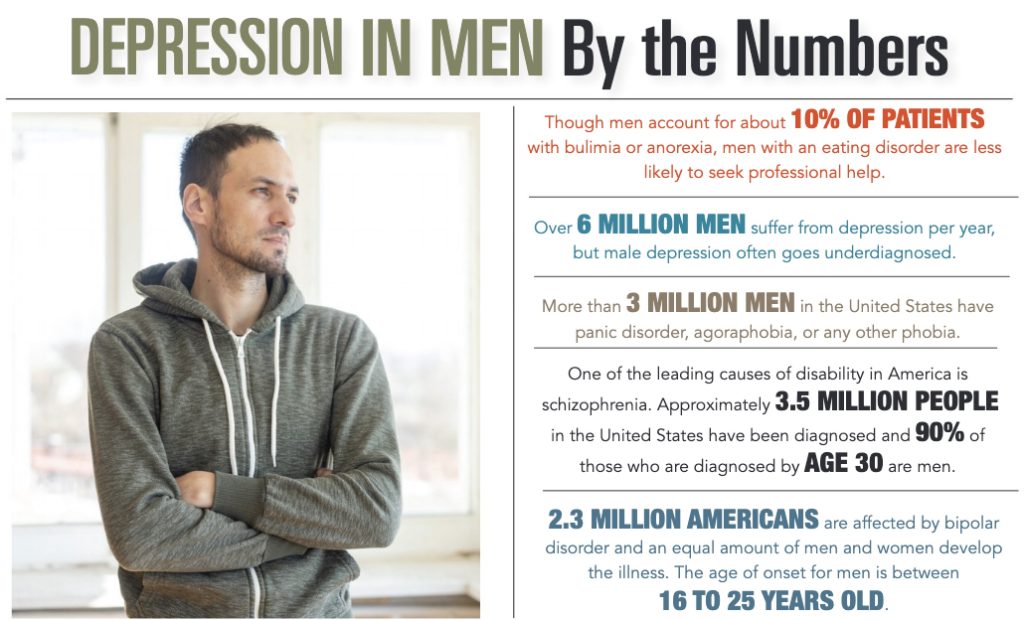The statistics about men and suicides are alarming: Though men comprise 49% of the population, they account for 80% of all suicides. Women are twice as likely to be diagnosed with depression, but men die by suicide three times more often, according to the Centers for Disease Control and Prevention.
Men’s depression and suicide are moving targets and their reaches are indiscriminate. In February, successful billionaire Thomas H. Lee was found dead of a self-inflicted gunshot wound in his New York office. Celebrated National Football League offensive tackle Lane Johnson took a timeout during the 2021 season, missing games to address mental health issues. Farmers, anonymous to everyone but those in their community, continued to have one of the highest suicide rates of any demographic in the country this year.
Money, fame and fresh air aren’t protecting men from the risk of succumbing to depressive behaviors.
Local health professionals – Brenton Reuger, master life coach in Charleston and Adam Cowan, former United States Marine and current licensed professional counselor associate of Wellspring Counseling in Greenville – weighed in on some of these sobering statistics with the hope that their reflections and advice will help HealthLinks readers.
Why It Happens
“There are a couple of factors at play here,” Cowan said, discussing the statistical discrepancies. Overall, men are less likely to seek counseling or support than women in general.”
Reuger agrees.
“Many of the labels that men attach to therapy define supportive measures such as coaching or personal development as weakness,” he said. “It can make them averse to seeking help.”
Another component of this issue is that men are less likely to engage in healthy socialization and prone to withdrawal from friends as depression begins its insidious creep into their mind.
“Generally, men are activity-based socializers: barbecues, sports or some other group activity. As we get older and maybe don’t have strong networks such as a club, a church or hobby, we’re less likely to be social. A man might feel constrained by family or work obligations and neglect this area of his life,” said Cowan.
“The lone wolf way of life is proving to be not who we are,” Reuger stressed. “Men thrive in connection, and, when we isolate, we begin to lose that connection and, thus, a part of ourselves.”
Cowan has faced this sense of loneliness firsthand.
“Isolation comes from a deeper place of depression. I’ve experienced this myself when I’m feeling depressed. It’s difficult to put yourself out there,” he said.
Speaking of isolation, the idea that a man should shoulder his burden solo also contributes to a decline into despair.
Both men mention those oft heard bon mots of “pulling yourself up by your bootstraps” or “suck it up, Buttercup,” that, heard in youth, may be woven into a man’s psyche as he gets older. These seemingly innocent comments can stick around for a lifetime.
“Much of what we learn about ourselves, our core beliefs, we develop between the ages of 1 and 8. That’s how we view who we are. That’s what steers the ship,” Reuger explained. “And that tough talk follows you into adulthood.”
Comparison is another pitfall according to Cowan.
“Many men inadvertently nurture their depression by being in comparison mode,” Cowan said. “Comparing one’s life against the success of others can give a person an overly negative assessment of himself and his future and it deflates him.”
These distorted appraisals of one’s life while in the company of peers and friends can further drive a man’s retreat into solitude.
When these contributing factors – fear, shame of weakness, isolation and defeat – finally culminate in a perilous amount of emotional pressure, many men become overwhelmed and see no other way forward.
Reuger discussed the danger of holding it all in: “Men repress emotions they otherwise need to express and avoid conversations they should have. This repression can make men a shell of who they truly are. All those stifled emotions come to a head and, well, men don’t know where to go. There is difficulty navigating the psychological and emotional realms for us and oftentimes it gets so bad, men don’t see any other way out.”
Common Indicators
Though there are scores of forewarnings that can indicate a man may be slipping into the grips of depression, some of the more common indicators, according to Cowan, are:
– Decreased socialization/lack of desire to socialize;
– Increased irritability, being easily frustrated;
– Increased substance use;
– Drastic change in appetite, either increased or decreased;
– Losing interest in activities in which you were once interested.
Beyond Recognition of Symptoms
Reuger said that allowing men to understand that there is strength in vulnerability can be a huge step in the right direction.
“If a man can take ownership of sadness or fear rather than disassociating from it, that helps,” he explained. “Depressed people benefit from someone simply holding space for them where no one is trying to ‘fix’ them. They need permission to say that they are hurting and that hurting doesn’t mean they’re weak or irrevocably broken.”
“Taking ownership means that we realize that we are the predominant creative force in our lives,” Reuger added. “I know it’s hard for men to see that. We tend to look to outside ourselves to measure our happiness. Whether it’s a partner, our kids, our jobs, our finances … we need to realize that none of these things should dictate how we feel about the core of who we are.”
What if a person doesn’t like who they are? Reuger has a suggestion for that concern as well.
“Sure. If there is a part of a man that he doesn’t like, then maybe that aspect of his personality needs to ‘die’ by way of change,” he explained. “But the man himself, he needs to understand that he should live.”
Cowan believes that radical honesty helps men make huge strides toward improved mental health as well.
“The golden rule in the work I do is as soon as we recognize an issue, we acknowledge it,” Cowan said. “Men are chronic minimizers, always saying that something is not a big deal. I suggest that we resist that tendency. We need to truthfully admit that we are struggling, because if you keep doing the things you’re doing, you’ll continue to struggle.”
Another suggestion is to fight the urge to isolate.
“As we get older, life’s demands increase, and it takes so much intentional effort to make plans. Over time, it becomes easier to just not. The longer you stay in your comfort zone, the harder it is to get out of it,” said Cowan.
He also noted that recognizing that your depression is “a liar” can bolster your well-being.
“Depression is an excellent liar and terrible influence. It tells you to stay home, to drink more, that no one needs you, that you don’t provide worth,” Cowan explained. “Call it out. Call it a liar and prove it. Don’t stay home. Accept the invitation to meet with friends, to talk to someone. Know that you may not enjoy it but go anyway. Give it just five minutes and see if socializing offers some relief.”
Exercise is another mood booster.
“And look, I’m going to say this. It’s a discussion I have with all my clients,” Cowan pointed out. “Being dedicated to exercise is a superpower in the fight against depression. The science is clear. Exercise boosts serotonin and offers a mental reset. Exercise also helps regulate emotions. If you’re low on energy, go to the gym. You don’t have to have a marathon workout, even just 15 minutes can help.”
Simply standing tall can reinforce an improved mood as well.
“Posture – it’s so simple, but depression can literally push us down, have us slumped over and looking at the ground,” Cowan added. “Intentionally standing up straight, opening our shoulders and having a good stance puts us in a position to feel dignified. It can be empowering if done in the right way.”
How to Ask For Help
Ultimately, no matter what steps a man takes toward bettering his mental and emotional health, he needs to break free from the belief that asking for help is a weakness, both Cowan and Reuger noted. Men need to ask for help before the burden of their feelings becomes dire and inescapable.
“Every man is different, and each is raised differently as to what strength looks like. I get that. But the strongest thing we can do is acknowledge that we can’t do this on our own,” said Cowan. “Our friends and family are invested shareholders in our lives, which means that there are hundreds of people that will empower you to live the life that you want. To invite someone in to be a partner in supporting you is brave and, frankly, it’s critical.”
“There is strength and bravery found in asking for help,” Reuger added.
Resources: National Suicide Prevention Lifeline: 988
SCDHECDMH hope.connectsyou.org
By Amy Gesell

